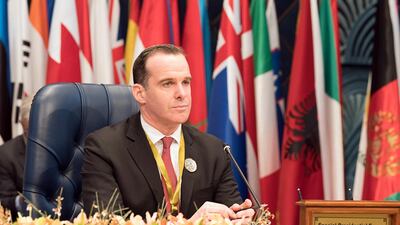The US envoy to the anti-ISIL coalition says that the battle against the insurgents in Iraq and Syria is not over.
Brett McGurk said on Wednesday that more than three years after ISIL swept into northern Iraq and Syria, the extremists remain a threat.
"Even though there has been progress made against ISIS- the fight is not over, we have to make sure we follow through", he told The National, in reference to the US' military and humanitarian support mission.
Although Iraq’s Prime Minister Haider Al Abadi announced victory against ISIL in December, he ordered security forces, last month, to eliminate “ISIL sleeper cells” and protect civilians
“The operations aim to put pressure on both the Syrian and Iraqi sides of the border, that particular fight is not over yet,” Mr McGurk said.
The US-led coalition against the insurgents continues to support Iraqi forces three years after the militant group captured a third of Iraq’s territory.
“Iraq has cleared 100 per cent of its territory that used to be controlled by ISIS and 3.2 million Iraqis have returned to their home in areas that used to be controlled by ISIS," Mr McGurk said. "We have to make sure the defeat of ISIS is an enduring one.”
The extremists have not been able to reclaim any of the liberated territories due to military, humanitarian and comprehensive stabilisation plans that were put in place three years ago with the Iraqi government, the special presidential envoy for global coalition to defeat ISIL said.
However, the militant group's collapse in its Iraqi and Syrian strongholds does not spell the end of its violence.
Referring to Syria, Mr McGurk said the coalition is working to ensure that none of the detained insurgents are released.
_______________
Read more:
UAE and Gulf states pledge billions for Iraq
Comment: Miscalculation and vulnerability simmer beneath the surface of the Syrian conflict
Beyond the Headlines podcast: Iraq's reconstruction and the challenges ahead
_______________
The Syrian Democratic Forces (SDF), who served as the coalition’s main partner in Syria have managed to capture hundreds of foreign fighters.
“We are working together to ensure that none of the fighters can get out and threaten their communities and that justice is done in a way that [is consistent] with international law.”
The focus is now on the immediate stabilisation and reconstruction of areas in need. “That is going to be a ten-year process,” Mr McGurk said referring to an Iraq fundraising international conference in Kuwait attended by dozens of potential donors.
Iraqi officials said rebuilding and developing hospitals, schools, homes, roads and telecommunications was the key to providing jobs, returning hundreds of thousands of displaced people to their homes and ending several decades of violence.
Mr Al Abadi stressed that the entire Middle East had a stake in his country's fate.
“It was a bloody and tough war, our homes were destroyed, schools devastated, streets turned into battlefields, we tolerated this because not only were we fighting for Iraq but for all humanity,” he said during the conference.
Iraq wants to raise the estimated $88 billion needed to rebuild ravaged areas. Numerous Iraqi cities were reduced to rubble during the fight against ISIL.
Mosul, the country’ second largest city was one of the hardest hit places, with nearly 40,000 homes needing to be rebuilt or repaired before residents displaced by the war can return, according to the UN.


